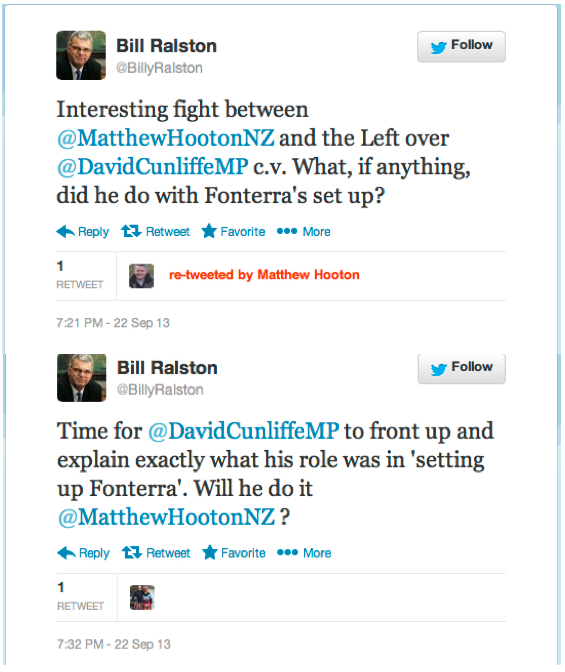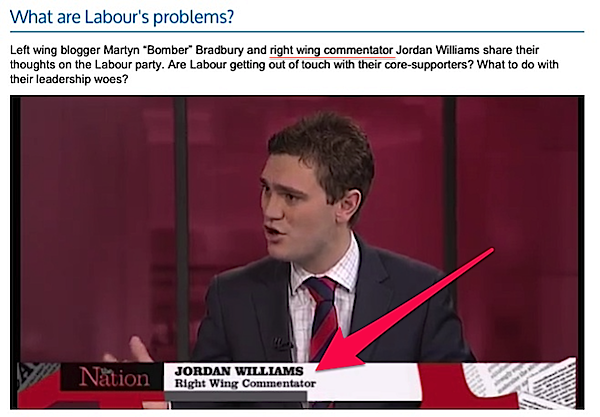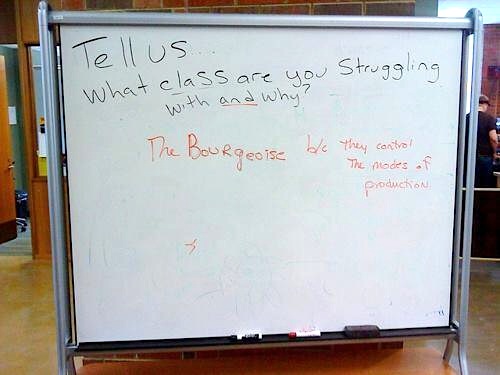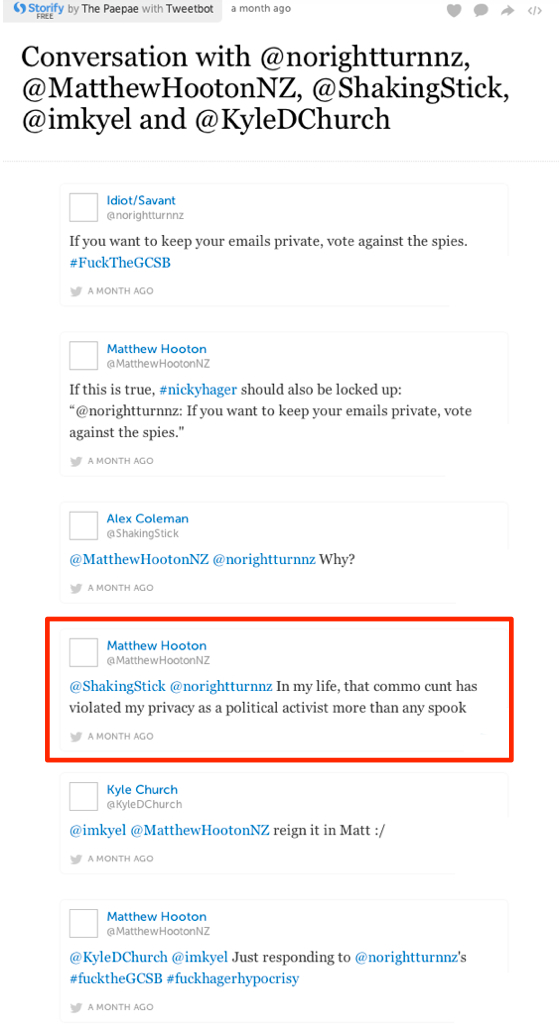“I put my right hand in,
I put my right hand out,
In out, in out.
shake it all about. …”
— words to the popular 1940s participation song (from Wikipedia)

Did anyone else notice these two “paid PR practitioners” (to quote Steven Joyce) tag-team wrestling to smear the Opposition Leader? Going for their ‘Teamwork’ badge?
Prompted by Bill Ralston’s use of the label ‘the Left’ above and an earlier comment in another thread wherein Ivan says:
I’m not a leftie .. or a rightie … I’m just confused.
… I got thinking (again) about how underpowered that ‘Left’ vs ‘Right’ nomenclature seems when used to describe political ideologies.
For instance, ask yourself, how useful is this label?:

Right Wing Commentator. TV3’s The Nation calls a spade a spade.(pic: frontpage.co.nz)
Put aside for the moment how tenable you think it might be to ask Jordan Williams — neatly labelled a ‘Right Wing Commentator’ — to wax lyrical on the topic ‘What are Labour’s problems?’ (I mean, Bill Ralston gets asked for his opinions about ‘the Left’ all the time, so, bokay.)
I don’t know how Jordan feels about being so classified by the media. He may be immensely proud. In my own observation, Jordan describes himself as ‘a constitutional lawyer’ or a ‘public lawyer’ (two noble vocations) — descriptions which nicely blur the lines. What is he really?
Based on his track record (fronting the Peter Shirtcliffe/Simon Lusk anti-MMP campaign and Don Brash’s ACT Party leadership coup) I personally see Jordan as a paid political mouthpiece — nothing more, nothing less. He is, it seems to me, merely another lobbyist who, it appears, works for ‘right wing’ figures or interest groups. (As if we need more of those, eh Bill? Sheesh!)
Now, I might be doing Jordan Williams a terrible disservice. It may be that he’s done/does amazing work for Greenpeace, or the People’s Centre/Community Law, or a trade union. I’m genuinely open to correction on that score. (Let me know in comments below.)
“both sides of the political spectrum” – that’s a pretty narrow spectrum if you ask me
I read here, in an announcement that the author of The Righteous Mind, Jonathan Haidt (whose ideas we’ve discussed here before e.g.) was to join New York University as a Professor of Business Ethics. Congratulations to him, I must say. As you read this clip, look for another example of the widespread, almost unconscious use of the creaky Left vs Right not-so-much-a-spectrum-as-a-partisan/binary-divide model …
Haidt is widely recognized for research on the intuitive foundations of morality and how morality and emotion vary across cultures. In recent years, he has used moral psychology to understand America’s ideological and hyper-partisanship. This work is the focus of his best-selling new book, The Righteous Mind: Why Good People Are Divided by Politics and Religion. His work draws consistent praise from both sides of the political spectrum, and is covered often in The New York Times and The Wall Street Journal.
Yeah, Haidt is a sensation. Well-deserved, too. We can do with more ethics in business.
But that line ‘both sides of the political spectrum’ really misses, doesn’t it? The left-bank, right-bank thing as a demarcation of politics is, in my opinion, getting really dumb. Even more so when slippery weasels try to spin the idea that their party is ‘centre-right’ while their opponents are ‘far left’ or ‘hard left’ — all this while a minority-government-only-in-power-by-the-slenderest-of-margins hurriedly sells state assets claiming a ‘mandate’ (cough) for their policy despite abundant evidence to the contrary. (Surely, these can be seen more as the actions of a ‘hard right’ ideological ‘regime’, rather than ‘centre-right’ — no?)
The idea of a ‘spectrum’ is fine, but it’s apparent that people don’t form a monolithic thought brigade based on their position on some issues. If Haidt’s book The Righteous Mind teaches anything it teaches that we each have ‘moral taste buds’ which can vary — we can coalesce around different issues, and our allegiances can vary.
So, we have smart people like poormastery describing themselves as ‘economically conservative but socially liberal’ — a thought echoed in former UK Tory MP, former rock chick and ‘glitzy’ novelist Louise Bagshawe/Mensch’s one-time bio/positioning statement on Twitter:

“Conservative means deliver liberal ends.”
Left and Right as ‘definers’ — just too granular
Many times in interactions or debate about the allocation of resources — politics in other words — there’s a race to be the first to ‘define’. Why is that important?
When I was studying Policy Analysis at Vic, Professor Bob Gregory described how those social/political issues which are defined as ‘problems’ will attract government intervention (read: $$$) or changes to legislation. As a result, the role of the Policy Analyst, whether working for the state sector, NGOs or private sector (lobbyists, ‘think tanks’, pressure groups, etc) has evolved to be all about providing persuasive evidence — tools and arguments with which to try to get their goal area defined as a ‘social problem’ — or, as in the case of, say, ‘problem gambling’ to minimise perceptions of harm. Spin doctors are deployed on both ‘sides’ … some playing up the social harms, and others spinning to rehabilitate the image of the ‘gaming industry’.
Thus, we have surveys and research and all manner of statistical data shovelled in front of decision makers — sometimes by lobbyists (!) or other representatives of interest groups — with the goal of convincing them to allocate priority to them. Or to dis-allocate it.
Consider measures opposed to tobacco smoking, to cut ACC levies, sponsor an irrigation scheme, or interventions such as subsidies for the insulation of rental properties. These ‘initiatives’ come about because someone has made a case for them. e.g. that cold damp homes for working class people are a ‘social problem’… and, once defined as such, that justifies government intervention. I see the copper broadband pricing kerfuffle getting under Steven Joyce’s skin in those terms.
I remember last year seeing Prime Minister John Key on TV describing the incidence of rheumatic fever in NZ as ‘a disgrace’ — a disease of third world countries, but out of place in Godzone, Aotearoa NZ. So, having been defined as a social problem, government programmes/funds are mobilised. (I don’t disagree with any of that.)
From another perspective, Rich Dad Poor Dad author Robert Kiyosaki (channelling EST) says: At any given time, you’re either buying someone else’s reality, or selling them your own. (Choose, in other words.)
It’s not just that I think the thought-free, indiscriminate use of labels like ‘Right wing’ and ‘Left wing’ to divide people and arguments is too broad-brushed or coarse to be useful, and most use of it tribal or sectarian. The problem also arises that assuming a position of ‘I don’t have to think about this any more because I’ve labelled you political opposition‘ creates democratic ‘hearing problems’ and hard-heartedness. (e.g. Remember when John Key described those marching against his Bill extending the GCSB’s surveillance powers as ‘either politically aligned or misinformed’ see: With respect, Mr Key, you misjudge me.)
Use of the ‘Left’ and ‘Right’ tags (or other allegations of brainlessness because you’re not in my team) don’t actually point to the issues that may be relevant to the debate. It’s true that traditionally small-c conservative parties serve a constituency which is rural, capitalist and employer-friendly, and small-p progressive parties often have links to the trade union and civil rights movements. But democracy doesn’t have to be bitterly partisan like trench warfare, does it?
Aside: I saw this question to students on Twitter this week and laughed like a drain:

“Q: Tell us what class are you struggling with and why? A: The bourgeoisie b/c they control the modes of production.” Great wit! (click for link to @davidwearing’s tweet)
Reality bites

Cathy Odgers (left) as Kiwi ninja — engaged in extracurricular activities in San Francisco during the America’s Cup regatta. (Campbell Live – click)
As I’ve said before, I really try to keep my views focussed on drivers other than political affiliation. I try to listen to what people are saying, or advocating … without paying too close attention to their ‘tribe’. I fail sometimes, and drop into shorthand and stereotype, but I do try. (cf: the punchline from Leave John Key Alone: “He’s a human!”)
That’s why poor old Martyn Bradbury sometimes gets a hard time here, and right wing vixens like Cathy ‘Cactus Kate‘ Odgers get shown a bit of respect now and then … when they make sense. (Oh, did you see Cathy was one of the ninjas who flag-bombed Larry Ellison’s ‘party house’ in San Francisco? [pic] Choice!)
Another example: I’m critical about how National Party activist Cameron Slater operates. Cameron doesn’t like it when I criticise him. His wife and his co-dependent enablers like it even less. Oh dear. But let me be clear: I don’t hassle him publicly because he’s a ‘right wing blogger’. No, not at all.
As I’ve explained, I openly question the veracity of some of Cameron’s assertions — his truthfulness. And I frankly despise some of the dodgy tactics he uses, his willingness publish vitriolic personal abuse and ugly name-calling. It seems to me he behaves in a unbalanced, nasty and intimidatory manner.
Leave aside Cameron’s apparently slippery ethics. On that point, I read a good article at the Financial Times website last week about John Le Carré which, talking about the British Secret Service recruiting spies, used the phrase:
“The attraction of someone with a semi-criminal background was irresistible to the spooks, he says. They were looking for recruits with a broad sense of morality, individuals who were unanchored and wayward, who hankered for discipline…”
‘A broad sense of morality’ — nice. That reminded me of Cameron Slater, with his willingness to expose (or to threaten to expose) other people’s (irrelevant) private information as a sanction for arguing with him, or criticising his beloved Party’s figures. I’ve seen Cameron attempt to use his dubious megaphone and spotlight as an offensive weapon. And when he’s wounded, defensively too.
Cameron also uses devious behind-the-scenes tactics, justifying his dirty tricks by a firm belief that his ‘opponents’ are at least equally dirty, as we discussed in the post ‘Cameron Slater’s defective moral calculus‘. For people like Cameron, as with the late Andrew Breitbart, the attack is everything, the details nothing.
That behaviour has its own ‘reward’ and consequences. One of them we’ve discussed before: Dan Gilmor’s concept of ‘Negative Credibility‘ — the idea that information actually has an appearance of LESS veracity because of its source. Gilmor pointed to Andrew Breitbart’s exposé of the Weiner/underpants/twitter ‘scandal’. Gilmor and others said because the story was coming from Breitbart (a notoriously partisan political propagandist and internet storm trooper) he was inclined to believe it less. Even though it was true, as it turns out.
I recall last year, following hard on the heels of Chris Trotter’s assessment that (Breitbart wannabe?) Cameron Slater, as a result of shilling for the Ports of Auckland company faces the “complete loss” of any “journalistic credibility [he was] beginning to establish in the mainstream media”, I observed this: Cameron publicly complaining about being ignored (oh noes!) by producers and journalists at TVNZ’s Sunday programme. Cameron put it in these terms …
Thus far Sunday & John Hudson have barely acknowledged me and chosen to ignore the information I have.
Ouch. Poor Cameron. Perhaps he thinks it’s because they’re ‘lefties’?
Matthew Hooton’s fevered worldview
Matthew Hooton, it has to be said, is someone who displays the ‘broad sense of morality’ referred to above. (See how useful that phrase is?) That’s just how I see him. Matthew is a very slippery customer, and good at the lobbyist/spin doctor/’paid PR practitioner‘ thing. About that, among other things, Steven Joyce and I agree.
So, one can’t leave this topic without a reference to Matthew’s recent contribution to political debate, letting slip how he regards Nicky Hager, author of The Hollow Men. (Read this post ‘Hollow Man Matthew Hooton recites his creed‘ for background. By coincidence, it also refers to Cathy Odgers and Jordan Williams.)
In the middle of debate about the GCSB Bill and invasions of privacy — not least journalist Andrea Vance whose phone records and emails were hoovered up as part of the Henry inquiry (see: Spy scandal journalist speaks out) — Matthew Hooton (whom I think we could all agree would be fairly described as a ‘Right Wing Commentator’ by The Nation or anyone else) published a revealing comment about his sense of outrage about his own privacy being invaded …
Of course Matthew Hooton is entitled to his opinion, and to express it. Just like Bill Ralston and David Farrar. But for me, calling Nicky Hager “that commo c*nt” betrays a level of irrational animus in Matthew that makes me understand those who say such unmitigated personal attacks/expressions of sentiment should disqualify him from ‘commentating’. Well, if I was producing the radio show, I’d give it some serious thought, given the precedent of Martyn Bradbury’s ejection from Afternoons with Jim Mora (See: Bradbury: Martyr or moderated troll?) But I may also be tempted to keep Matthew on in the spirit of Let’s Give ’em Something to Talk About. Does Matthew go too far? What do you think?
But Matthew’s ‘political analysis’ (cough) in this case also doesn’t seem accurate to me either. We’ve seen Matthew determinedly scrape the bottom of the barrel before — in a far more good-natured way: Prior to the last election he stooped to (inaccurately) describing Green Party co-leader Russel Norman as not just a Communist, but a ‘Trotskyite’, a ‘committed Marxist Leninist’ etc etc … (see: A rich Green comedy performance from Matthew Hooton. Bizarre, but very entertaining.)
It seems that by Matthew’s black-and-white map of the world, people who oppose his views (‘right wing’? Are they really?) must all be ‘commo c*nts’ and devious, conniving radicals — a belief which, as we saw in this post, Be careful what you believe neatly justifies devious, conniving actions …
…Right Wing spin doctors and bloggers/activists/schemers like [Slater] (and only a handful of others – in NZ anyway) have convinced themselves that their Left Wing ‘opponents’ are waging a dirty, unprincipled propaganda war and will stoop to virtually any sleazy strategy to gain influence or advantage. So strongly do they, as a group, hold this belief that they (the Right-wing cabal) feel they are therefore completely justified in waging a dirty, unprincipled propaganda war and to stoop to virtually any sleazy strategy to gain influence or advantage. I bet some on ‘the Left’ think exactly the same way. (Trevor Mallard, I’m looking at you. And you Martyn Bradbury.)
Sad really.
– P
Facts are stated to the best of my knowledge and commentary is my honest opinion. Corrections or clarifications are always welcome by email. Comments are open, but may be moderated.
– Best wishes, Peter Aranyi © 2013 All rights reserved.



[…] alongside Matthew Hooton’s earlier public statement that Nicky Hager is a “commo c*nt” and his obvious disrespect for Ms Ryan and contempt for Radio NZ’s editorial standards, I […]
The problem with all NZ political commentators is their income is derived from what they are peddling whether it be PR, media or contracting advising political parties.
As you have observed my extra curricular activities are politically neutral and dangerous things happen when I socialise with working class Moa drinking builders and blokes.
I am fiscally neutral in my political opinion and don’t rely on the right or left for any income.
But the mask did nothing for the hair did it?
Hi Cathy,
This: “…what they are peddling whether it be PR, media or contracting advising political parties”
Why do you include ‘media’ in that list? Surely members of the media derive their income from their jobs — they’re paid by a news organisation to observe and report on news events?
I agree with your comment re spin doctors (‘paid PR practitioners‘, as Steven Joyce says) or sometime advisors like Matthew Hooton and Ralston. That type clearly has a row to hoe, but even with such ‘commentators’ there has to be a line beyond which they don’t stray in their ‘peddling’, surely?
I think your extra curricular stunt looked great fun — and yes, it was a whole lot more ‘politically neutral’ than, say, the Kiwis who now face two months in Russian custody awaiting trial on piracy charges for crewing a Greenpeace ship drawing attention to the risks of Antarctic oil drilling.
oh yes…about that mask.
Thanks for jinxing TNZ, I understand that Joyce was there before you pulled that stunt
‘working class Moa drinking’ is an oxymoron. Have you seen the price of that beer? I tend to think of right wingers as being self centered, lacking empathy and lacking the ability/desire to understand others situations. Someone who appears to think that the working class can afford to drink Moa falls into that category.
Its the type of beer that also makes one look as though you have taken your dentures out … due to the horrified sucking in of ones cheeks after the first taste …
Like moleskins … its a taste best reserved for the well funded palate …
[…] so eloquently about Andrew Breitbart (‘The attack is everything, the details nothing’) cited recently in relation to some local […]
I have seen a large number of examples of people or commentators of the Left whining about being described as Lefties.
I have never seen anyone on the Right complaining abdout being called a Rightist or Righty ot whatever the term is.
What does it all mean?
Rgds,
*p*
I think the term is “Right Wing Nutjob” isn’t it? or “Heartless Neocon Capitalist running dog” … or some such 🙂
Do I complain? I don’t think so.
I’m a sickly white liberal … and a swinging voter. (I’m not of the persuasion that declares that casting a vote irredeemably ‘biases’ an observer.)
– P
Oh, there’s a troll who pops up here who accuses me of being a ‘Labour shill’ which I object to purely on the grounds that it’s inaccurate (… and, I guess, a smear?)
[…] Source […]
[…] Source […]
[…] has fronted for several political lobby groups over the years – invariably those promoting the right of the right causes. Notably the recent […]
[…] has fronted for several political lobby groups over the years – invariably those promoting the right of the right causes. Notably the […]